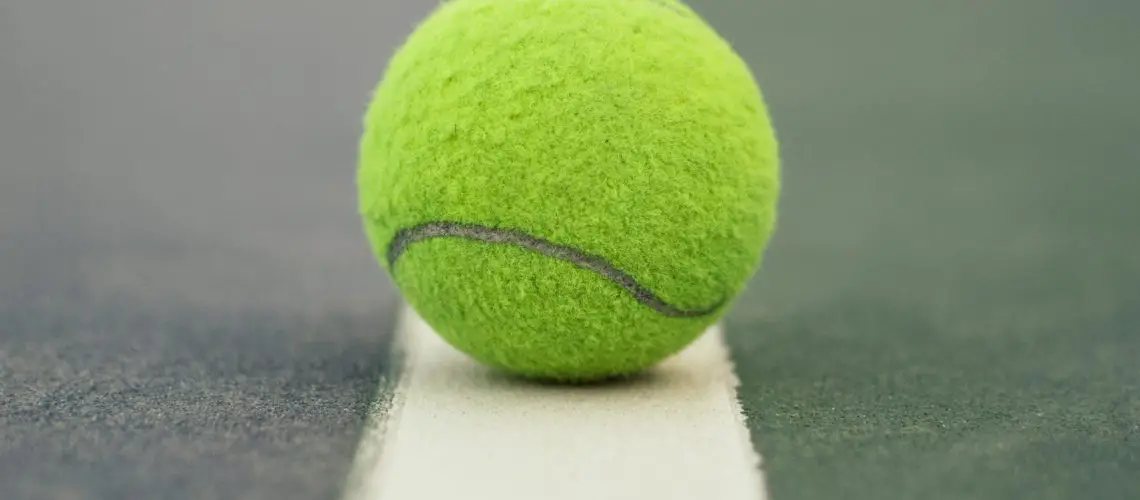We may earn money or products from the companies mentioned in this post.
Introduction

When it comes to playing tennis, choosing the right tennis ball can have a significant impact on a player’s performance The type of ball you use not only affects how it feels when you hit it, but also its suitability for different playing conditions and surfaces In this article, we will explore the factors to consider when selecting tennis balls, including the type of ball and the court surface, as well as your skill level and playing style
Importance of Choosing the Right Tennis Ball
Selecting the right tennis ball is crucial because it directly affects your game Playing with a ball that doesn’t suit your needs can hinder your performance on the court Whether you’re a beginner or an experienced player, using the right ball can make all the difference in terms of control, spin, and overall playability
Furthermore, different playing conditions and surfaces require specific types of tennis balls Hard courts may wear down balls more quickly compared to clay or grass courts Therefore, choosing a durable ball suited for hard surfaces can ensure consistent performance throughout your game
Factors to Consider When Selecting Tennis Balls
Type of Ball:
There are two main types of tennis balls: pressurized and non-pressurized Pressurized balls have compressed air inside them to enhance their bounce and speed off the racquet Non-pressurized balls, on the other hand, do not contain any internal pressure Additionally, there are regular duty and extra duty balls that cater to different playing conditions
Court Surface:
The court surface you play on is another critical factor in choosing the right tennis ball Hard courts require sturdy balls that can withstand frequent impacts without losing their bounce too quickly Clay courts demand softer balls that allow players to generate more spin and control Grass courts, with their unique playing characteristics, also have specific ball requirements
Skill Level and Playing Style:
Your skill level and playing style should also be considered when selecting tennis balls Beginners may benefit from using softer balls that offer more forgiveness and allow for better control Advanced players might prefer faster balls that respond well to power shots and provide a livelier bounce
In conclusion, choosing the right tennis ball is essential for optimizing your performance on the court Considering factors such as the type of ball, court surface, skill level, and playing style will help you find the perfect match that suits your needs and enhances your overall playing experience
Types of Tennis Balls

Tennis balls come in different types, each offering unique characteristics that cater to players’ preferences and court surfaces Let’s explore the various types of tennis balls and their properties
Pressurized Tennis Balls
Pressurized tennis balls are the most commonly used type in professional matches and recreational play alike They are designed to provide optimal performance on various court surfaces
-
Composition and Structure:
Pressurized tennis balls have a rubber core that is filled with air or nitrogen gas This inner core is then covered with a layer of wool or nylon felt -
Pros and Cons:
One advantage of pressurized tennis balls is their enhanced bounce and speed, allowing players to experience dynamic gameplay However, these balls have a shorter lifespan as the pressurized gas gradually escapes over time, leading to decreased performance
Non-Pressurized (Pressureless) Tennis Balls
Non-pressurized tennis balls offer an alternative option for those seeking consistent performance without worrying about pressure loss over time
-
Composition and Structure:
These balls feature a solid rubber core that eliminates the need for internal pressure Similar to pressurized balls, they also have a wool or nylon felt exterior -
Pros and Cons:
The main advantage of non-pressurized tennis balls is their ability to maintain a consistent bounce over an extended period However, they may lack the same speed as pressurized balls due to their solid core construction
Regular Duty vs Extra Duty Felt
The felt on tennis balls plays a crucial role in determining their suitability for different court surfaces Two common types of felt used are regular duty and extra duty
-
Regular Duty Felt:
Regular duty felt is ideal for clay or indoor courts It provides good traction on these surfaces, allowing players to control their shots with precision -
Extra Duty Felt:
Extra duty felt is specifically designed for hard court surfaces such as asphalt or concrete It offers increased durability and can withstand the rougher texture of these courts
Understanding the different types of tennis balls and their characteristics can help players choose the right ones based on their playing style, court surface, and personal preferences Whether you opt for pressurized or non-pressurized balls, or regular duty or extra duty felt, finding the perfect combination will enhance your overall tennis experience
Court Surface Considerations

Hard Courts
When it comes to hard courts, the choice of tennis ball felt can significantly impact the game Using extra-duty felt on hard courts has several benefits Firstly, this type of felt is more durable and can withstand the rough surface of hard courts, reducing wear and tear on the ball Additionally, extra-duty felt provides better grip, allowing players to generate more spin and control on their shots This combination of durability and enhanced grip makes extra-duty felt an excellent choice for hard court play
On the other hand, using regular-duty felt on hard courts may have some drawbacks Regular-duty felt is designed for softer surfaces like clay or grass, so it may wear out faster on hard courts The smoother surface of regular-duty felt can also result in less grip, making it more challenging for players to generate spin and control their shots effectively Therefore, while regular-duty felt can still be used on hard courts, it may not offer the same advantages as extra-duty felt
Clay Courts
Regular-duty felt is often preferred when playing on clay courts due to its unique characteristics The benefits of using regular-duty felt on clay are twofold Firstly, regular-duty felts have a shorter nap that allows them to interact better with the clay surface This interaction creates more friction between the ball and the court, resulting in slower-paced rallies with higher bounce levels Secondly, regular-duty felts tend to pick up less clay particles during play compared to extra-duty felts, which helps maintain consistency in ball performance throughout a match
However, using extra-duty felts on clay courts does come with some drawbacks Extra-duty felts have a longer nap that can easily pick up loose clay particles from the court’s surface during play This can lead to a faster accumulation of clay on the ball, affecting its performance and making it harder to control Therefore, while extra-duty felts may be suitable for other court surfaces, they may not be the best choice for clay court play
Grass Courts
When playing on grass courts, choosing the right tennis ball is crucial The best type of ball for grass court play is one with a softer felt surface This type of felt allows the ball to grip the grass better, providing players with more control and stability during their shots A softer felt also helps ensure that the ball does not skid or slide too much on the fast-paced grass surface By using a ball with a softer felt surface, players can optimize their performance and adapt to the unique challenges posed by grass courts
Skill Level and Playing Style

Beginner players
When it comes to tennis, choosing the right ball can make a significant difference in your skill development as a beginner The right ball can help you build confidence, improve your technique, and enhance your overall playing experience So, how do you determine which ball is suitable for beginners? It’s essential to look for balls specifically designed for beginners
Beginner-level tennis balls are typically slower and have less bounce than intermediate or advanced-level balls These characteristics allow beginners to have better control over their shots and longer rallies Additionally, these balls are often made with softer materials to reduce the impact on the player’s arm and provide a more comfortable feel
Intermediate players
As an intermediate player looking to optimize your performance on the court, selecting the right tennis ball becomes crucial The choice of ball can affect your consistency, spin generation, and overall game strategy
Intermediate players should consider using regular-duty or all-court tennis balls that offer a balance between control and durability These balls provide a moderate amount of bounce and are suitable for various court surfaces, including hard courts, clay courts, or grass courts
In match play situations, it’s important to remember that different brands of tennis balls may vary in their characteristics such as felt texture or pressure retention Experimenting with different brands and types of balls during practice sessions can help you find the ones that best suit your playing style
Advanced and professional players
Advanced and professional players often have unique playing styles that require customized equipment tailored to their specific needs Tennis balls are no exception
Customizing tennis balls involves altering certain aspects such as pressure or weight to match an individual player’s preferences Some players prefer a slightly heavier ball to generate more power, while others may opt for a lighter ball to enhance maneuverability
For tournament play, it’s essential to use tennis balls approved by the International Tennis Federation (ITF). These balls undergo rigorous testing to ensure consistent performance and meet strict standards ITF-approved balls are designed to provide optimal bounce, durability, and visibility, ensuring fair competition among professional players
Remember that the choice of tennis ball can greatly impact your playing experience at any skill level Whether you’re a beginner looking for control and comfort or an advanced player seeking customized options, selecting the right ball is an integral part of enhancing your game on the court
Conclusion

Choosing the right tennis ball is a crucial decision for any player, regardless of their skill level In this article, we have explored the key factors that should be considered when selecting a tennis ball: the type of court surface, playing style, and personal preference By taking these factors into account, players can ensure they are using a ball that suits their specific needs and enhances their performance on the court
Summary of Key Factors
When choosing a tennis ball, it is essential to consider the type of court surface you will be playing on Hard courts require durable balls with strong felt to withstand the abrasive surface Clay courts, on the other hand, call for softer balls that provide better grip and spin Grass courts require balls with low bounce to adapt to the fast-paced nature of the surface
Another factor to consider is your playing style If you are an aggressive player who hits powerful shots, opting for a heavier and faster ball can help you maintain control over your shots and maximize your power On the contrary, if you rely on finesse and precision in your game, lighter and slower balls might be more suitable
Lastly, personal preference plays a significant role in choosing the right tennis ball Some players prefer extra-durable balls that last longer and retain their bounce throughout extended play sessions Others might prioritize feel and touch, opting for softer balls that offer more control over shots
Importance of Proper Ball Selection
Proper ball selection is crucial not only for performance but also for enjoyment on the court Using the wrong type of tennis ball can negatively impact your game by altering how it responds off your racket strings or affecting its flight path during serves or volleys
By using the appropriate tennis ball suited to your playing style and court surface, you’ll experience improved consistency in your shots as well as enhanced control over spin and trajectory This can lead to a more enjoyable and satisfying game, allowing you to fully express your skills and compete at your best
In conclusion, selecting the right tennis ball involves considering the court surface, playing style, and personal preference By taking these factors into account, players can optimize their performance on the court and ensure an enjoyable playing experience So make sure to choose wisely before stepping onto the court for your next match!
Useful Links

How Tennis Players Choose Balls Before Serving
Why do tennis players choose the tennis balls they will …
How Do Tennis Players Decide Which Ball To Use?
Why do male tennis players at the US Open reject balls …
How to Choose a Tennis Ball
Battle of the Balls – TENNIS EXPRESS BLOG
What Tennis Balls Do The Pros Use? – The Racket Life
What do tennis players check for while selecting balls to play?
How to Choose the Right Tennis Balls
How to choose your tennis balls
Women use faster balls than men at U.S. Open. Some …
The 7 Best Tennis Balls: Reviews & Buyer’s Guide
How To Choose Your Tennis Balls?
How To Find The Perfect Tennis Ball For Professionals
At US Open, complaints about the ball before 1st one struck
Tennis Ball Buying Guide
How to pick the right Tennis Ball






